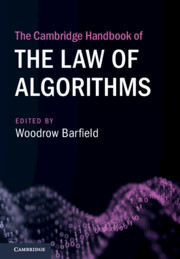Book contents
- The Cambridge Handbook of the Law of Algorithms
- The Cambridge Handbook of the Law of Algorithms
- Copyright page
- Contents
- Figures
- Tables
- Notes on Contributors
- Foreword
- Preface
- Acknowledgements
- Abbreviations
- Part I Introduction and Setting the Stage for a Law of Algorithms
- 1 An Introduction to Law and Algorithms
- 2 The Opinion of Machines
- 3 Private Accountability in an Age of Artificial Intelligence
- 4 Algorithmic Legitimacy
- 5 Understanding Transparency in Algorithmic Accountability
- Part II Business, Regulations, and Decision-Making with Algorithms
- Part III Intellectual Property and Algorithms
- Part IV Criminal Law, Tort Issues, and Algorithms
- Part V Constitutional Law, Human Rights, and Algorithms
- Part VI Applications and Future Directions of Law and Algorithms
- Index
1 - An Introduction to Law and Algorithms
from Part I - Introduction and Setting the Stage for a Law of Algorithms
Published online by Cambridge University Press: 19 October 2020
- The Cambridge Handbook of the Law of Algorithms
- The Cambridge Handbook of the Law of Algorithms
- Copyright page
- Contents
- Figures
- Tables
- Notes on Contributors
- Foreword
- Preface
- Acknowledgements
- Abbreviations
- Part I Introduction and Setting the Stage for a Law of Algorithms
- 1 An Introduction to Law and Algorithms
- 2 The Opinion of Machines
- 3 Private Accountability in an Age of Artificial Intelligence
- 4 Algorithmic Legitimacy
- 5 Understanding Transparency in Algorithmic Accountability
- Part II Business, Regulations, and Decision-Making with Algorithms
- Part III Intellectual Property and Algorithms
- Part IV Criminal Law, Tort Issues, and Algorithms
- Part V Constitutional Law, Human Rights, and Algorithms
- Part VI Applications and Future Directions of Law and Algorithms
- Index
Summary
A body of law is currently being developed in response to algorithms which are designed to control increasingly smart machines, to replace humans in the decision-making loops of systems, or to account for the actions of algorithms that make decisions which affect the legal rights of people. Such algorithms are ubiquitous; they are being used to guide commercial transactions, evaluate credit and housing applications, by courts in the criminal justice system, and to control self-driving cars and robotic surgeons. However, while the automation of decisions typically made by humans has resulted in numerous benefits to society, the use of algorithms has also resulted in challenges to established areas of law. For example, algorithms may exhibit the same human biases in decision-making that have led to violations of people’s constitutional rights, and algorithms may collectively collude to price fix, thus violating antitrust law.
Keywords
Information
- Type
- Chapter
- Information
- The Cambridge Handbook of the Law of Algorithms , pp. 3 - 15Publisher: Cambridge University PressPrint publication year: 2020
